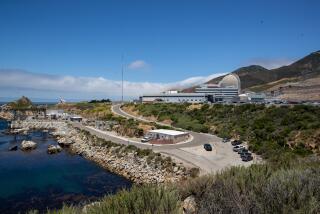Taiwanese Reach Compromise on Nuclear Plant
- Share via
HONG KONG — In an attempt to end one of the most damaging domestic political disputes of Taiwan’s brief democratic era, President Chen Shui-bian’s government announced today that it will give way to powerful opponents and agree to restart construction of the island’s controversial fourth nuclear power plant.
Under terms of a compromise reached between Chen’s government and leaders of the opposition-controlled parliament, authorization to resume work on the $5.4-billion power plant would be given immediately. In return, Chen’s government won a vaguely worded commitment from parliamentary leaders to develop a new energy law that would commit Taiwan to an eventual nuclear-free future.
At one level, the agreement immediately raised hopes of ending a high-level impasse that had in effect frozen the political agenda, dampened investor confidence and strained the very fabric of one of Asia’s most vibrant new democracies.
But for Chen and his 9-month-old government, the entire episode constitutes an embarrassing U-turn and a humiliating defeat, which could weaken him personally and deepen divisions within his Democratic Progressive Party.
Chen’s premier, Chang Chun-hsiung, who made the announcement in Taipei, the capital, described the decision as “painful” and pledged that the government would persist in its goal of achieving a nonnuclear future for Taiwan.
“He says we have put the country ahead of the party, but the cost to the party will be high,” warned Parris Chang, a senior DPP figure and chairman of the parliament’s foreign relations committee.
Chang said two of the DPP’s most senior leaders--Taiwan’s fiery Vice President Annette Lu and parliamentary floor leader Chou Po-lun--failed to attend a high-level party meeting Tuesday night, apparently in protest against the reversal.
It was Chen’s decision to make good on a campaign pledge to the environmentalist wing of the DPP that led his government to order the nuclear project scrapped in October, even though construction was one-third completed.
The move triggered an immediate uproar from the opposition Nationalists, who had fought hard to build the plant during their years in power. Government operations requiring cooperation across party lines slowed to a crawl, and the business community, worried about the security of energy supplies, expressed concern about the impact on Taiwan’s economic future.
Although the compromise is expected to defuse the immediate political impasse over the power plant, additional costs incurred as a result of the construction delays could sow the seeds of a new battle over additional funding for the project.
“It’s a vague light at the end of a very long tunnel,” said Andrew Yang, who heads the Chinese Council of Advanced Policy Studies in Taipei. “It will help the level of public confidence, but the scars of this dispute will be around for a long time.”
More to Read
Sign up for Essential California
The most important California stories and recommendations in your inbox every morning.
You may occasionally receive promotional content from the Los Angeles Times.













